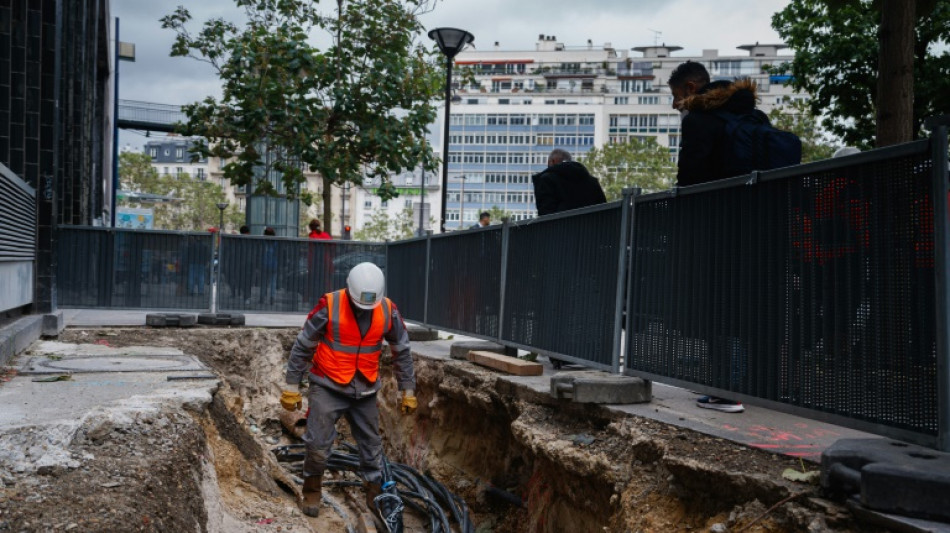
-
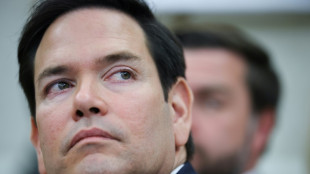 Rubio in Paris to meet Macron on Ukraine war
Rubio in Paris to meet Macron on Ukraine war
-
Asian markets boosted as 'Big Progress' made in Japan tariff talks
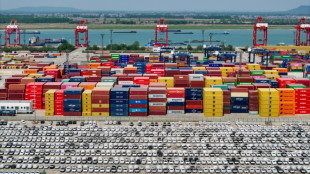
-
 Philippine film legend Nora Aunor dies aged 71
Philippine film legend Nora Aunor dies aged 71
-
Taiwan's TSMC net profit soars as US tariff threat looms

-
 Cartel recruitment at heart of Mexico's missing persons crisis
Cartel recruitment at heart of Mexico's missing persons crisis
-
Macron to hold Ukraine war talks with Rubio, Witkoff in Paris
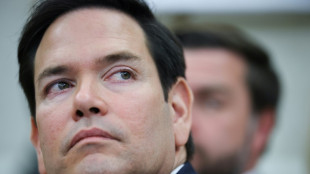
-
 Mahrang Baloch, a child of the resistance for Pakistan's ethnic minority
Mahrang Baloch, a child of the resistance for Pakistan's ethnic minority
-
Myanmar junta says to free nearly 5,000 prisoners in amnesty

-
 Taiwan's TSMC says net profit rose 60.3% in first quarter
Taiwan's TSMC says net profit rose 60.3% in first quarter
-
Hermes to hike US prices to offset tariff impact
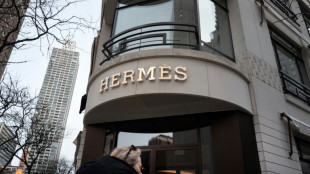
-
 Sri Lanka's women-run hotel breaks down barriers
Sri Lanka's women-run hotel breaks down barriers
-
Sweden turns up Eurovision heat with wacky sauna song

-
 Sweden goes into Eurovision as punters' favourite
Sweden goes into Eurovision as punters' favourite
-
Spanish youth keep vibrant Holy Week processions alive

-
 Eurovision promises glitz -- and controversy over Israel
Eurovision promises glitz -- and controversy over Israel
-
Italy's Meloni heads to White House seeking EU tariff deal

-
 F1 on Jeddah's streets - talking points ahead of the Saudi Arabian GP
F1 on Jeddah's streets - talking points ahead of the Saudi Arabian GP
-
Changing face of war puts Denmark on drone offensive

-
 Anger as China club plays hours after striker Boupendza's death
Anger as China club plays hours after striker Boupendza's death
-
Heat scorch Bulls to advance, Mavericks upset Kings

-
 Chinese investment sparks rise of Mandarin in Cambodia
Chinese investment sparks rise of Mandarin in Cambodia
-
Unease grows over Trump tariffs despite 'progress' in Japan trade talks

-
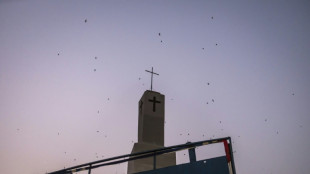 Nigerian mixed-faith families sense danger as violence flares
Nigerian mixed-faith families sense danger as violence flares
-
Asian markets boosted by 'Big Progress' in Japan tariff talks
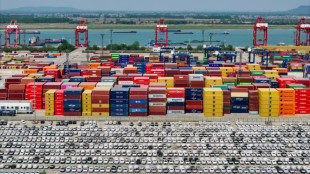
-
 No room for sentiment as Hinault returns to site of world title glory
No room for sentiment as Hinault returns to site of world title glory
-
ECB ready to cut rates again as Trump tariffs shake eurozone
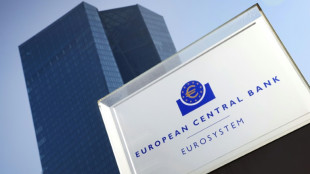
-
 Heat scorch Bulls to keep playoff dream alive
Heat scorch Bulls to keep playoff dream alive
-
Nigeria, Niger foreign ministers meet for security talks

-
 Rugby Australia hits out at French clubs poaching young talent
Rugby Australia hits out at French clubs poaching young talent
-
Canada PM Carney avoids French blunder as he faces attack in key debate

-
 El Salvador becoming 'black hole' for US deportees, critics fear
El Salvador becoming 'black hole' for US deportees, critics fear
-
Trump admin proposes redefining 'harm' to endangered animals

-
 Australia's Mary Fowler set for long lay-off after ACL injury
Australia's Mary Fowler set for long lay-off after ACL injury
-
Rubio to meet French leaders for talks on Ukraine
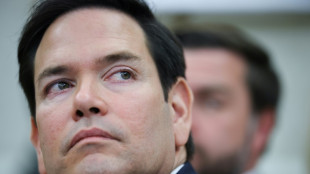
-
 Webb spots strongest 'hints' yet of life on distant planet
Webb spots strongest 'hints' yet of life on distant planet
-
Evotec SE Unveils New Strategy and Provides 2025 Guidance Bolstered by Strong Q4 2024 Results

-
 Arteta's Arsenal come of age with Madrid masterclass
Arteta's Arsenal come of age with Madrid masterclass
-
None spared in Nigeria gun, machete massacre: survivors

-
 'No problem' if Real Madrid replace me: Ancelotti
'No problem' if Real Madrid replace me: Ancelotti
-
Inter dreaming of treble glory after reaching Champions League semis

-
 'No limits' for treble-hunting Inter, says Pavard
'No limits' for treble-hunting Inter, says Pavard
-
Inter off Bayern to reach Champions League last four

-
 Rice 'knew' Arsenal would dethrone Real Madrid
Rice 'knew' Arsenal would dethrone Real Madrid
-
US stocks fall with dollar as Powell warns on tariffs

-
 Arsenal oust holders Real Madrid to reach Champions League semis
Arsenal oust holders Real Madrid to reach Champions League semis
-
Arsenal defeat Real Madrid to reach Champions League semis

-
 AMD says US rule on chips to China could cost it $800 mn
AMD says US rule on chips to China could cost it $800 mn
-
Inter hold off Bayern to reach Champions League last four

-
 El Salvador rejects US senator's plea to free wrongly deported migrant
El Salvador rejects US senator's plea to free wrongly deported migrant
-
Newcastle thrash Crystal Palace to go third in Premier League


France's City of Light switches to climate-resilient power cables
To maintain the glow of the City of Light, Paris is modernising its underground electric cables, vulnerable to damage during heatwaves and dating back 60 years.
With power cables melting from Portland to Sicily, the world's 80 million kilometres (50 million miles) of power lines are largely unprepared to resist extreme temperatures, scientists have warned.
The French capital over the next few months will be replacing its obsolete paper-insulated lead-covered cables (PILC), which are made of oil-impregnated paper encased in a lead sheath.
"We're anticipating the renewal of these cables, which are starting to be affected by heat, to have a very resilient network in Paris," said Olivier Lagnel, deputy regional director for utility firm Enedis.
Nearby, workers in orange vests worked in a trench close to the Montparnasse train station to replace the medium voltage PILC, which were installed in 1965, with modern, plastic cables.
State-owned Enedis says Paris is not alone: its counterparts in Chicago, London, Shanghai, Hong Kong, Osaka, Tokyo, Singapore and Sydney also plan to update their cables.
- 'Climate emergency' -
Trouble has mounted in recent years.
Paper-insulated during a 2003 heatwave in France showed weaknesses with "an incident rate multiplied by eight across the medium-voltage underground network", according to a March 2024 report by France's Court of Audit.
Overhead tramway cables melted in Portland in 2021 during record-high temperatures in the northwest US state of Oregon.
A searing heatwave in July 2023 left hundreds of thousands of Sicilians without electricity and water for days.
Heat damage to underground cables was to blame, said supplier e-distribuzione, the distribution arm of energy giant Enel.
"We find ourselves operating in conditions of exceptional climatic emergency," where the temperature of the asphalt on roads reached 50 degrees Celsius (122 degrees Fahrenheit), it said in a statement at the time.
A 2021 study led by Alessandro Bosisio, an assistant professor at the University of Pavia in Italy, found that "an abnormal increase of faults in underground Medium Voltage cable joints has been recorded, especially during summer" worldwide in recent years.
Climate scientists say the period being lived through right now is likely the warmest the earth has seen for the last 100,000 years, back at the start of the last Ice Age.
- Avoid cuts -
PILC cables, which were the international standard from the late 19th century until the 1970s, were long considered highly reliable.
They were wrapped in layers of oily paper intended to isolate the centre of the cable, which heats up as electrons pass through.
The cables were conceived to resist temperatures up to 90C (194F). But when heat is trapped for days under the asphalt, they can reach 120-130C (248-266F) -- ageing faster and eventually risking failure.
Paris's 9,200 kilometres of low- and medium-voltage power cables are entirely buried underground -- to save space and protect them from the wind, Lagnel said.
Enedis plans to phase out the obsolete cables in French cities by 2050.
"The main problem is that the insulator can dry up, and in that case the cable can be sensitive," said Lagnel.
"The idea is to avoid cuts as much as possible" and to "desensitise the network... as heatwaves come back more and more often, stronger and stronger."
A.Rodriguezv--AMWN



